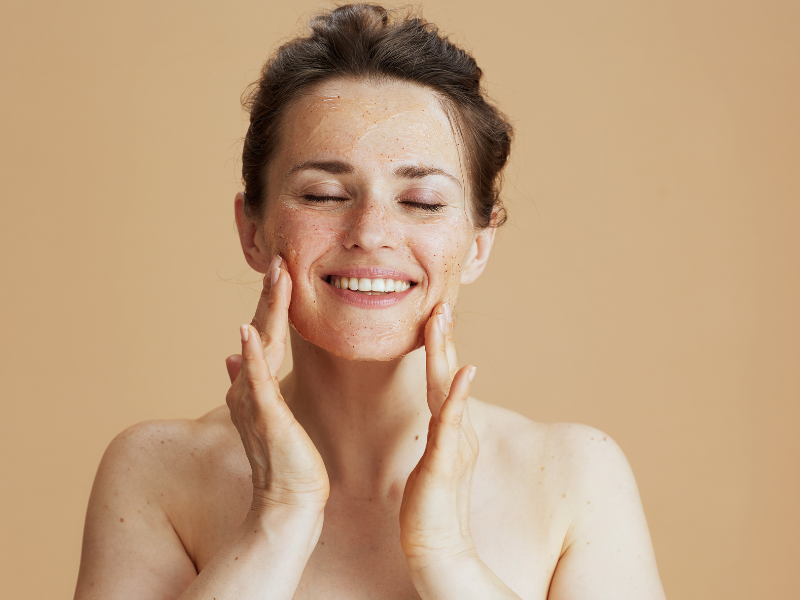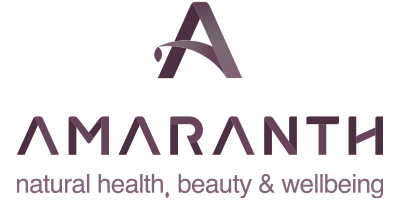How to support your skin in your 40's and beyond

In our 40s and 50’s we can experience significant skin changes, many of which are due to the changes in hormones at peri menopause and menopause. We will see an acceleration of skin aging with a reduction in collagen and elastin – two components that make up the structure of the skin. This will bring an increase in fine lines and wrinkles and a loss of skin elasticity. The skin will also lose some of the ability to hold moisture and our bodies produce less of the water attracting molecule hyaluronic acid. As a result, skin can become drier and lose some of the plumpness that hydrated skin has.
At this time, skin conditions may flare up or new conditions may develop.
So why does this happen?
The main contributing factors to skin changes are :
-
The natural aging process.
Up to the age of 25 to 30, the skin is thickening and renewing. After around the age of 30, the rate of renewal starts to slow down. The dermis slow starts to decrease in thickness and we start to see a loss in collagen, elastin and hyaluronic acid. Over time this leads to fine lines and wrinkles. -
Exposure to free radicals from sunlight, smoking, chemicals and diet
The aging process of the skin is accelerated by exposure to external factors, especially sunlight and smoking. Free radicals effectively steal energy/electrons which leads to the break down of collagen, resulting in deep wrinkles. -
Hormones
Skin cells, along with most cells in the body, contain oestrogen receptors. During our reproductive years (before the start of menopause), the reproductive organs produce oestrogen which binds to these receptors and sets off a cascade of positive benefits for the skin. From around age 35 onwards, we produce less oestrogen, as a result we will see a reduction in this action. This can dramatically increase the rate of breakdown of collagen and elastin. After menopause, there is a decrease in collagen content at a rate of 2% per postmenopausal year for up to 15 years in women not on hormone replacement therapy.
Declining oestrogen can also have an impact on the gut and the skin microbiome. This can imbalance the immune response leading to conditions such as rosacea and eczema. -
Inflammation.
A diet that is high in processed, fried foods and sugary foods and lacking in fresh fruit, vegetables and essential fats, can create an inflammatory state in the body. Inflammation leads to redness and may contribute to breakdowns on the skin and inflammatory conditions such as eczema. -
The microbiome of the skin and the gut.
Our bodies are home to billions of microbes that provide good bacteria in the gut and on the skin. These bacteria are our good army, supporting the balancing the immune response. The natural good bacteria can be disrupted by a diet lacking in fruit and vegetables, medications, and hormones at the menopause. This can contribute to acne, psoriasis, and eczema.
So far this all sounds doom and gloom, but the good news is that you can take steps now to provide your body with the raw material and nutrients to aid the repair process, whilst reducing those factors that contribute to skin concerns.
Eat Your Way to Healthy, Youthful Skin:
-
Enjoy an abundance of brightly coloured fruits and vegetables. Aim for 1 to 2 with each meal.
Choose from sweet potato, butternut squash, peppers, berries, carrots and other orange and red fruits and vegetables. These foods are high in antioxidants. These pair to free radicals to reduce the damage that they can cause and help to delay skin aging -
Boost your omega 3 fatty acids. Aim for 1 portion daily.
Choose from oily fish, macadamia nuts, flaxseeds, chai seeds or an omega 3 supplement. Omega 3 fats are essential for balancing inflammation in the body and for the flexibility of the membrane of all cells (including skin cells) -
Add vegetarian protein sources. Aim for at least 1 portion daily
Choose from beans, lentils, nuts, seeds, quinoa, nuts, seeds
Protein provides amino acids that are the building blocks for all of the tissue on the body including collagen. -
Remember water : 1.5 to 2 liters daily (this can include herbal teas)
Water will flush toxins through the liver and help support hydration of the skin.
-
Try fermented foods :
Choose from sauerkraut, kimchi, kefir and kombucha
Fermented foods are rich in beneficial probiotics and microbes, these help to balance the skin and the immune response. These are especially important in conditions such as eczema, psoriasis, acne and rosacea
-
Add Phytoestrogens :
Choose from beans, flaxseeds, tofu, tempeh
Phytoestrogens contain a structure similar to their bodies natural oestrogen and so it is believed that they can attached to the oestrogen receptors in the skin and provide some of the benefits that the bodies oestrogen can provide.
Nutritionist Recommended Supplements for menopausal skin
All of the recommendations here can be purchased at www.amaranth-wellbeing. For more advice and personalised suggestions contact the nutrition team at hello@amaranth-wellbeing.com
Collagen
To provide the specific amino acids required for the body to synthesis collagen.
Natures Plus Collagen Peptides, Planet Paleo Primal Goddess
Hyaluronic acid
To replace the hyaluronic acid that has reduced production in the body with aging, to provide hydration to the skin and joints.
Viridian Hyaluronic acid capules
Omega 3 Fish Oils
Essential fats to balance inflammation and for skin cell membrane health
Bare biology Life and Soul Omega, Cytoplan Fish Oil
Probiotics
Beneficial bacteria for the skin and gut, to balance inflammation and the immune response.
Udo’s Super 8
Vitamin C
An essential cofactor in collagen production
Viridian Extra C
Menu ideas for Wellness, Sleep and Healthy Hormone Balance
Breakfast :
- Smoothie made with berries, plant milk and collagen or natural protein powder
- Kefir with berries and ground flaxseeds
- Smoked salmon and avocado on sourdough
Lunch
- Soup with vegetables and beans or lentils
- Salad with rocket and spinach, tomatoes, peppers and egg, salmon or chicken
- Wholemeal wrap with humus, falafel, tomatoes and salad leaves
Evening meal :
- Mixed bean chili with brown rice
- Roasted butternut squash and sweet potato with grilled fish or meat
- Stir fry with peppers, onions, mushrooms and prawns, tofu or chicken
Snacks
- Berries and yoghurt
- Dark chocolate with mixed nuts
- Energy balls made with dates, nuts and seeds
Discover more with Personalised Nutrition
Book a free 15 minute health review for personalised nutrition and supplement suggestions. To book a free health review with Joanne for personalised nutrition advice, please click here.
